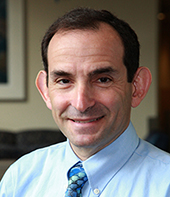For Immediate Release
Monday, Sept. 27, 2021
Contact:
Maria Maslennikov maria.maslennikov@nih.gov
Dr. Brooke Decker joins NIH Clinical Center as Hospital Epidemiologist, Dr. David Lang to serve as the new Chief of the Office of Patient Safety and Clinical Quality

The National Institutes of Health Clinical Center, the world’s largest hospital dedicated exclusively to research, announced the appointment of two professionals who are integral to the hospital’s steadfast commitment to high reliability in the safe delivery of patient-centric care. NIH Clinical Center Chief Executive Officer James K. Gilman, M.D., promoted Dr. David Lang to serve as the Chief of the Office of Patient Safety and Clinical Quality and selected Dr. Brooke Decker as the new Hospital Epidemiologist and Chief of the Hospital Epidemiology Service.
Having worked at the hospital since 2002, Lang is familiar with the inner workings of the Clinical Center. As the lead clinician for the pediatrics consult service, he has a stellar record of ensuring the safety of the hospital’s younger patients. He is the first physician to lead the Patient Safety and Clinical Quality office, a group tasked with working within the hospital and with NIH partners to support the highest quality of patient safety, care, and research support.
Lang has been a member of the Clinical Center’s Patient Safety, Clinical Practice and Quality Committee since its inception in 2017 and recently led an effort to assess the overall consistency, quality and documentation for the many medical consult services that provide patient assessments at the Clinical Center.

“I’m very excited and honored to have this opportunity. Patient safety and high-quality care are integral to the life changing clinical research we do,” said Lang.
Decker returns to the Clinical Center at a time when the COVID-19 pandemic has underscored the importance of hospital epidemiology. She served as Hospital Epidemiologist, Chief of Infection Prevention and Director of Antimicrobial Stewardship at the Pittsburgh Veterans’ Administration hospital for the past seven years.
Decker is no stranger to the Clinical Center. She completed a three-year fellowship that combined training in Infectious Diseases, Hospital Epidemiology and Critical Care Medicine at the hospital. She then spent a year as a Clinical Research Fellow in the Clinical Center’s Hospital Epidemiology Service.
Over the past seven years, she has become a recognized national expert in the field of antimicrobial stewardship. During her time in Pittsburgh, she distinguished herself particularly in the epidemiology, transmission and prevention of waterborne infections, especially Legionella.
“I am humbled by the opportunity to serve the NIH Clinical Center as the Director of the Hospital Epidemiology Service. There is no more crucial enterprise to the progression of medical knowledge, and no greater honor than to serve these hallowed halls,” said Decker.
Lang earned his medical degree at the University of Maryland and completed a Pediatrics residency at Emory University. In addition to his undergraduate and medical degrees, he holds a Master’s in Public Health from the Johns Hopkins Bloomberg School of Public Health. Decker earned her medical degree from Case Western University and completed an Internal Medicine residency also at Case Western.
###
About the NIH Clinical Center: The NIH Clinical Center is the world’s largest hospital entirely devoted to clinical research. It is a national resource that makes it possible to rapidly translate scientific observations and laboratory discoveries into new approaches for diagnosing, treating, and preventing disease. Over 1,600 clinical research studies are conducted at the NIH Clinical Center, including those focused on cancer, infectious diseases, blood disorders, heart disease, lung disease, alcoholism and drug abuse. For more information about the Clinical Center, visit: https://www.cc.nih.gov/.
About the National Institutes of Health (NIH): NIH, the nation's medical research agency, includes 27 Institutes and Centers and is a component of the U.S. Department of Health and Human Services. NIH is the primary federal agency conducting and supporting basic, clinical, and translational medical research, and is investigating the causes, treatments, and cures for both common and rare diseases. For more information about NIH and its programs, visit www.nih.gov.

